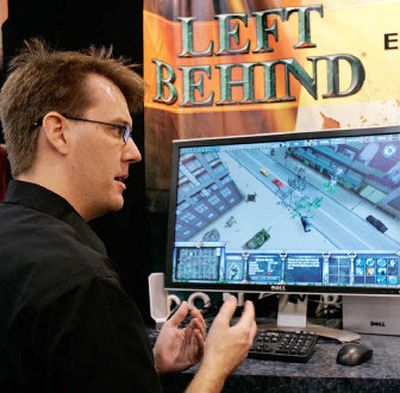Game of eternity

The streets of New York have never looked so barren.
An occasional taxi or bus motors down a boulevard as people wander aimlessly among eerily vacant buildings. Soon, black helicopters loom overhead and armed soldiers close ranks on the streets below.
This isn’t your run-of-the-mill video game: “Left Behind: Eternal Forces” is based on the best-selling “Left Behind” book series about the apocalypse.
But it’s the apocalypse without dismemberment or graphic bloodshed – though the game has an element of violence that some Christians argue is counter to teachings of the Bible.
“Eternal Forces” is the first effort from Left Behind Games Inc. of Murrieta, Calif., which has a license to develop games based on the “Left Behind” novels by Jerry B. Jenkins and Tim LaHaye that have sold more than 63 million copies.
Like the books, the game is built around those left on Earth after millions of Christian believers ascend to heaven during the Rapture.
Its creators, who hope to wriggle into the multibillion-dollar mainstream video game market with its release later this fall, defend the faith-based theme.
“What we’ve decided to do is embed our message in a game so that it’s not overt but it is in the game,” Left Behind Games President Jeffrey Frichner says.
“We’re not ashamed of it. There are Scriptures in the game and we’re faithful to those Scriptures.”
Video game analyst Michael Pachter, who has played “Eternal Forces,” estimates it will sell between 250,000 and 1 million units – far more than any other Christian video game – because of its high quality.
The current market for Christian video games is essentially nonexistent, he says, but there is opportunity, given the growing popularity of Christian products and the fact parents want nonviolent fare for their children.
“They did a nice job,” Pachter, who follows the industry for Wedbush Morgan Securities Inc., says of the “Eternal Forces” creators. “The question is, will the game be perceived as too preachy for the mainstream, and I just don’t know. We’ll see.”
Set in New York, the game begins with smoldering landscapes, eerie streets and wandering nonbelievers and evildoers. The object is to convert nonbelievers and ultimately prevent evil forces from taking over the world.
Left Behind marketing manager Greg Bauman won’t be specific about how to achieve victory before the game is officially released. However, a demo version available free of charge on the company’s Web site provides some clues.
As commanders of the forces of good, players need to make sure their people are housed and fed, nurtured with prayer and armed to defend themselves for eventual battle.
Every person depicted has a name and a history, which emphasizes the human cost of battle, Frichner says.
Along the way, players find clues to Bible mysteries and other information. Christian rock groups provide background music.
Want to ward off evil? Hit the prayer button.
In the single-player mode, the player battles evil forces. In the multiplayer mode, players may choose to represent evil or good. Gamers also can play each other online.
The PC-only game cost between $3 million and $5 million to produce. It will sell for $49.99.
Since it was previewed in May at the Electronic Entertainment Expo in Los Angeles, “Eternal Forces” has drawn opposition from those who contend the violence goes against the Bible.
“It’s reprehensible,” says Florida attorney Jack Thompson, a critic of video game violence. “They’re basically using the phrase ‘Christian game’ to disarm parents into thinking it’s going to be OK for our kids.”
Left Behind Games co-founder Troy Lyndon has posted a statement on the company’s Web site calling the game a classic battle of good and evil.
Frichner says it depicts choices people must make when faced with threats.
“Do we just lay down and allow aggressors to kill us, or maim us or pillage us?” he asks. “I think most Americans would answer no. We defend ourselves.
“To remain faithful to the ‘Left Behind’ series, we couldn’t make a game that didn’t have that element in it.”